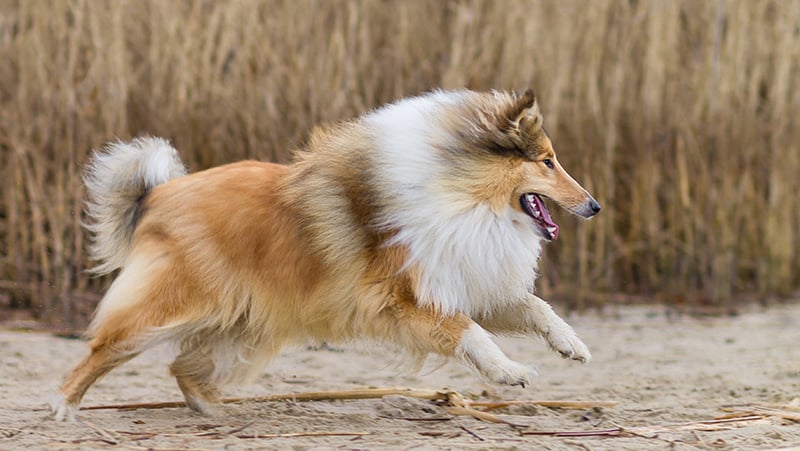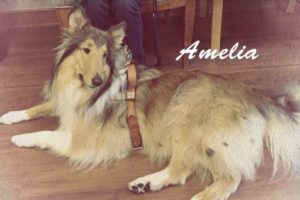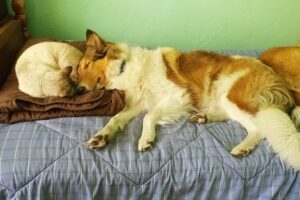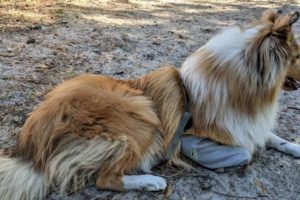Rough Collies, also known as Lassie dogs, are widely recognized for their elegant appearance and intelligence. But one misconception about these beautiful creatures is that they are lazy and laid-back compared to other breeds. Is this actually true?
Are Rough Collies really lazy – or just misunderstood? In this article, we will delve into the personality traits and daily habits of these dogs to answer the question once and for all.
Whether you’re a potential owner who wants to know more or simply curious about this herding breed’s behavior, read on to uncover the truth of whether or not Collies are truly lazy pets.
Table of Contents
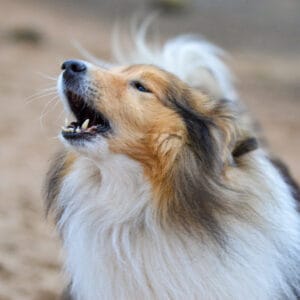
Rough Collies: The Origin Story
The Rough Collie breed originated in Scotland during the 18th century, where they were mainly used as herding dogs for sheep and cattle. It is believed that their distant ancestors were brought to the British Isles during the Roman invasion and became mixed with local dogs. The original Rough Collies had less voluminous fur than the modern-day show type and came in more color varieties.
In the mid-19th century, Queen Victoria became enamored with the breed after visiting Scotland and seeing them at work. Her interest popularized them among the nobility, which led to their inclusion in dog shows. During this time, the first standards for judging Rough Collies’ physical characteristics were established.
There was also a short-haired Collie version, today’s Smooth Collie. In the United Kingdom, Rough Collies and Smooth Collies are considered separate dog breeds, but not in the USA. They can even be born in the same litter. Nevertheless, both breeds share traits such as loyalty towards their owners, similar energy levels, and social compatibility with other animals.
Over time, selective breeding – focused on looks more than working abilities – and changes in the breed standard led modern-day show Collies to look different than the early type, though some breeders adhere to the older Scottish Collie standards.
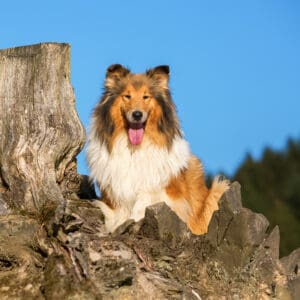
Debunking the Myth: Why Rough Collies are Not Lazy Dogs
Are Rough Collies Lazy? No. Debunking the myth that Rough Collies are lazy dogs is important to highlight a breed whose work ethic might be overlooked. While they may not have the high energy of some breeds (like the Border Collie), this does not make them lazy or inactive. In fact, being bred as working dogs means they still excel when given a job to do.
Both Smooth Collies and Rough Collies are impressive in their versatility and adaptability. They can be consummate athletes in a wide variety of sports like herding, agility, Rally, fast CAT, and dock diving, just to name a few. Some are good all-purpose farm dogs, service dogs, or even search and rescue dogs. With their intelligence, trainability (easy to train), and adaptability, Collies can easily learn new skills while still being gentle companions.
Though most Collies have medium drive, each individual has their own unique traits and personality. Regardless of breed heritage, some dogs may prefer lounging around while others thrive on activity. Keeping an open mind about a breed’s capabilities allows potential owners to find the perfect match for their lifestyle, rather than simply relying on stereotypes or popular perception. Ultimately with Rough Collies, laziness should never be assumed but rather evaluated through observation of both nature (breed tendencies) nurture (owner behavior).
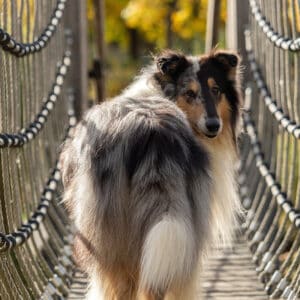
Daily Exercise Needs: How Much Activity is Enough for Rough Collies?
As with any dog, daily exercise is an essential aspect of maintaining the health and well-being of Rough Collies and Smooth Collies. Though they have average energy compared to some high energy breeds like Border Collies (their workaholic cousins), they do require a moderate amount of physical activity to keep them happy.
For mature adult Rough Collies, the recommended daily exercise is at least one hour per day, preferably with 15-30 minutes of more intensive/interactive activities. For most Smooth Collies and Rough Collies, daily walks combined with a chance to run around a yard or park will be fine. Some enjoy a round of fetch, and most like playing “tag” with their human or other dogs. Collies can even make good apartment or condo dwellers if they can stretch their legs every day.
For rainy day activities, many Collies will enthusiastically shred carboard boxes – an odd but funny breed quirk. Hide-and-seek is generally a big hit, and tug-of-war is often another favorite game. There are even tug-of-war suction cups that allow dogs to entertain themselves!
Suction Tug Toy
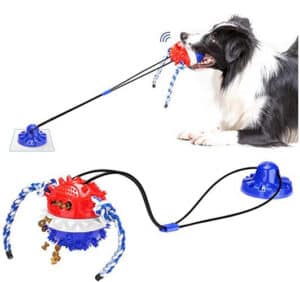
Bungee Tug Toy
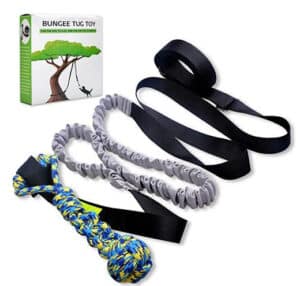
It’s important to note that growing puppies have different exercises needs than adults. Activity helps to develop strong muscles and bones. However, it is key to not exceed their limit while exercising regularly, but to gradually increase it over time.
Keep in mind that a dog who is fully grown physically is not yet mentally mature. “Puppy brain” may last well past their first birthday. Many dogs are rehomed or surrendered to a shelter around the age of one, due to people’s misconception that they should have calmed down already. That’s like expecting a human teenager to be on the level of an adult! Most Collies really start to mature around the age of two, if not sooner. Sadly, too many people don’t understand canine mental development and give up on their dogs too soon.
Fortunately, most Smooth Collies and Rough Collies have a good “on/off switch.” The great thing about a Collie is their desire to match their human’s level of activity. Do you want to go for a walk or hike? Then so do they! Are you a jogger? Then they are too! What if you feel like being a couch potato some days? That’s fine with them!
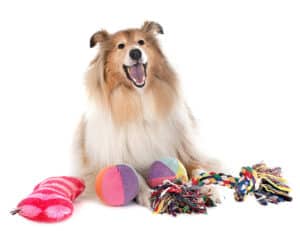
Training Tips: Encouraging Healthy Habits and Discouraging Laziness
Daily walks are not only a healthy habit, but also a great bonding and training opportunity. Pet owners can inspire their furry friends to live an active lifestyle, but with Collies more often than not it’s the other way around. Providing regular exercise through walks/playtime is important for maintaining physical fitness and endurance, and you’ll be helping yourself out too.
Since dogs overheat more easily than humans, make sure your double-coated Collie has plenty of access to water during exercise. Remember, they have an inner coat and thick outer coat; If they’re lagging behind, they may just be hot. Again, not lazy – just trying to tell you something! And of course they need a well-balanced diet just as much as you do to fuel their workouts. Food is energy, after all.
Don’t focus solely on physical exertion and neglect mental stimulation. Puzzles or other interactive toys will provide entertainment and challenge your Collie’s problem-solving skills. For motivation, use positive reinforcement and offer treats or praise when they display initiative towards activities like these. Collies love positive feedback! Often your praise will be more rewarding than treats.
Overall Rough Collies are not lazy dogs per se; still, if you have one that shows signs of indifference towards physical activity, make sure their mind remains engaged in beneficial pursuits. Many Collies enjoy “brain games” to keep them sharp.
Dog Treat Puzzle
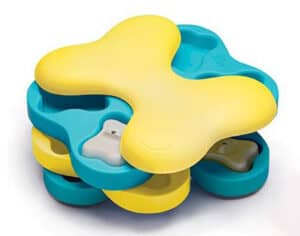
Dog Puzzle Toy

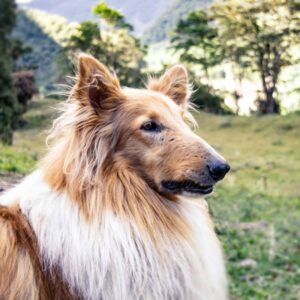
Health Concerns: The Risks of Overfeeding and Inactivity in Rough Collies
Exercise must be combined with proper feeding to maintain any dog’s health. Overfeeding leads to obesity, which can cause a variety of health problems such as joint pain and diabetes. Diet should be adjusted according to a Collie’s age, size, energy level, and lifestyle.
Far too many people overfeed their dogs! Dogs are cute, and treats are an easy way to make them happy in the moment. But we have to focus on our Collies’ long-term happiness. Try making them work for their treats and food. But is that mean? you may wonder. Not at all! Give them a job. Collies are a working breed, so it’s natural and fulfilling for them to exercise or have a quick training session before eating.
Use kibble sometimes instead of treats. You can even take some kibble (subtracted from their meal quota) along in a treat pouch on walks and work on some training then. Then feed your dog the rest of their meal when you get back. Treats are usually higher in fat, so feed a smaller meal portion if they’ve been given many or large treats during the day.
Never, ever free feed! Automatic feeders or a continuously full food bowl are actually terrible for a dog’s health. Generally, Collies don’t tend to eat excessive amounts. Some may even be picky about their food. But free feeding just encourages them to eat more than they should.
Collies may overeat because of boredom or depression from not having enough to do or look forward to. They are sensitive beings, and they might “eat their feelings” just as people sometimes do. Lack of stimulation may result in behavioral issues like anxiety.
Slow Feeder Bowl
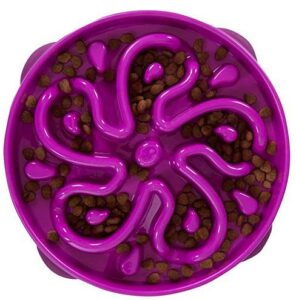
Pet Lick Mats
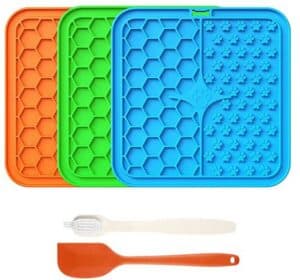
Did you know canine flatulence can be the result of overeating? If your dog has toxic farts, that’s not good for them (or you)! How are their bowel movements? Normal stools in the morning and mushy stools at night are indicators of eating too much. Does your Collie have skin disorders, excessive year-round “moulting”, itchiness, tear staining, chronic ear issues, or a tendency to eat feces? These may actually be signs your Collie is getting too much food and treats!
Visually, how can you tell if your Collie is overweight? Viewed from the top, your Collie should have a waist – that “hourglass shape.” From the side, their chest should be deeper than their stomach. If it’s a straight line instead of a slant, that’s an issue. This is much easier to tell on Smooth Collies though.
For Rough Collies, you may need to check for obesity by feel rather than sight. Normally the test is to see the last two ribs, but in this case you actually should be able to easily feel the last two ribs without pressing in very much. Rather like running your fingers across the back of your hand and being able to feel the bones there.
Inactivity in Collies can negatively impact their mental well-being. Sometimes it’s not so much about the physical activity as the chance to smell the smells and read some “pee-mail.” Dogs can get cabin fever too! Remember when the Covid pandemic was in full swing and people barely left their homes? Did you get stir crazy? Then imagine how a dog who never gets out feels!
Lethargy in Collies is not the norm. It may be mistaken for laziness, but it can actually be a sign of overeating. Here’s another thing to watch for: lethargy, listlessness, and weight gain can also be symptoms of a thyroid condition. If you’re exercising your Collie, not overfeeding them, and they’re still showing these signs, talk to your vet about getting a blood test done to check for thyroid issues.
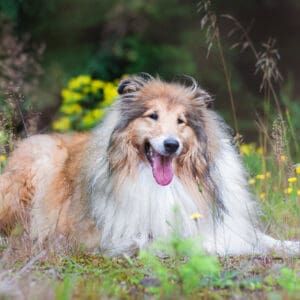
Conclusion: Finding a Balance between Rest and Play
Living with a Rough Collie requires finding the right balance between rest and play. These dogs enjoy spending time outdoors, but they need relaxation time to recharge their batteries. Rough Collies are not lazy; instead, they prefer a balanced lifestyle that caters to both their energetic and laid-back sides.
It’s all too easy for humans to create laziness in dogs then say, “Well, that’s just how they are.” Very few dogs are truly lazy by nature. Remember to look at the whole picture: a combination of nutrition, medical care, socialization opportunities, and regular exercise should be provided to keep your Collie active throughout their life. By bringing them lifelong joy, you’ll bring yourself joy too!
*This article was written with the help of Wordplay.
